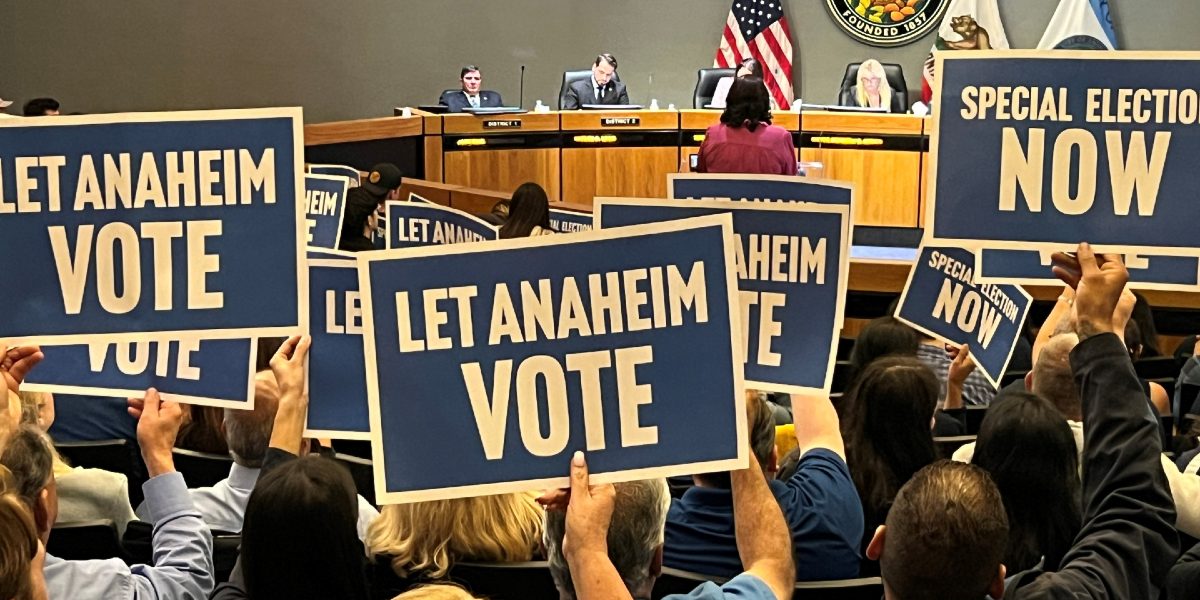Anaheim voters have overwhelmingly rejected Measure A, a measure sponsored by militant hotel workers union UNITE-HERE Local 11 that would have imposed a complex set of work restrictions and wage increases on every hotel and “event center” in Anaheim, regardless of size.
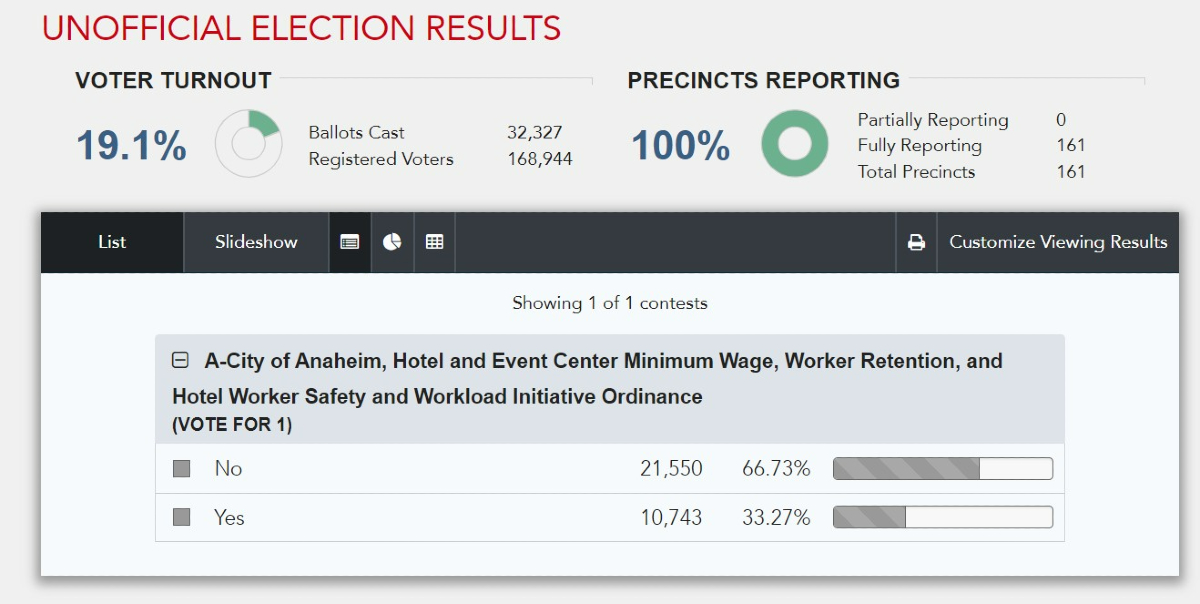
The results mark a decisive victory for the business coalition that mobilized to defeat a ballot initiative that posed a mortal threat to their ability to thrive as business concerns, employers and generators of tax revenue for the city.
It was also a serious political defeat for UNITE-HERE Local 11, whose “Yes on Measure A” campaign spent more than $720,000 to gain voter approval. It is also a big loss for Ada Briceno, who wears two hats as co-president of UNITE-HERE Local 11 and chair of the Orange County Democratic Party. Briceno and her Local 11 co-presidents are leading a troubled rolling hotel strike in Los Angeles and Orange counties, and passing Measure A would have been a significant boost to those efforts.
They were opposed by a broad coalition of businesses, spearheaded by the independent, family-owned hotels that comprise most of Anaheim’s hospitality sector. Disney, Marriott and Wincome contributed sizable donations, enabling the No On Measure A campaign to mount an approximately $3.5 million effort to defeat the ballot measure.
UNITE-HERE Local 11 focused its messaging on the provision mandating that hotel housekeepers be equipped with personal security devices – “panic buttons” – and boosting the minimum wage at all Anaheim hotels and event centers to at least $25 an hour, with an annual escalator built into it.
However, several months ago the Anaheim City Council adopted a “panic button” ordinance, and Anaheim hotels have been actively equipping their housekeeping staff with these devices.
Furthermore, wages at the larger hotels are already moving toward the $25 an hour level, and wages at even the smaller hotels are well-above minimum wage. UNITE-HERE’s credibility on the issue was also compromised by the fact that the union pays members of its own staff significantly less than the $25 an hour “living wage.”
The most economically destructive aspect of Measure A was its costly and byzantine work rules, which drastically limited the hotel room square footage that housekeepers could clean without triggering doubling their wage to $50 an hour for the entire shift. In other words, if a housekeeper cleaned one square foot more than the Measure A permitted, then the hotel would have to pay them $50 an hour for the entire shift.
The square footage limitation effectively cut in half the number of rooms housekeepers could clean without triggering the $50 an hour wage. Measure A’s provisions further reduced the square footage threshold if housekeepers had to clean rooms on two floors, or clean “special rooms” – i.e. a room with two beds, which is typical in Anaheim Resort hotels.
The independently-owned hotels and event centers were highly motivated to mobilize and work to defeat Measure: for them, it was a matter of life-or-death. If passed, compliance would require them to dramatically increase their staffing, reduce the number of rooms for rent, reduce employee benefits, or some combination thereof. Those increased costs would be passed on to Resort visitors in the form of higher room rents, putting Anaheim hotels at a competitive disadvantage.
Even those measure might have proved insufficient, and many family-owned hotels would have faced the prospect of closure.
“The energy and dedication of our coalition represented the best of Anaheim – diversity, dedication and a focus on doing what’s right for the future of this great city,” said Kimberly Painter, General Manager of the Anaheim Majestic Garden Hotel. “We were passionate about defeating Measure A because it attacked the livelihood of so many small businesses, their employees and the safety of Anaheim.”
Measure A also would have applied to city-owned facilities like the Anaheim Convention Center. Economic studies predicted major economic and tax revenue losses for the city if Measure A were enacted. It was estimated its passage would cost the city $90 million in tax revenue during the first ten years, a key factor in the city council’s decision to vote 5-0 to officially oppose Measure A. Mayor Ashleigh Aitken and Councilmember Carlos Leon supported Measure A, and in May had voted to adopt it as a city ordinance without studying its economic impacts on the city.
Measure A Loses Across Anaheim
Measure A lost in all six council districts:
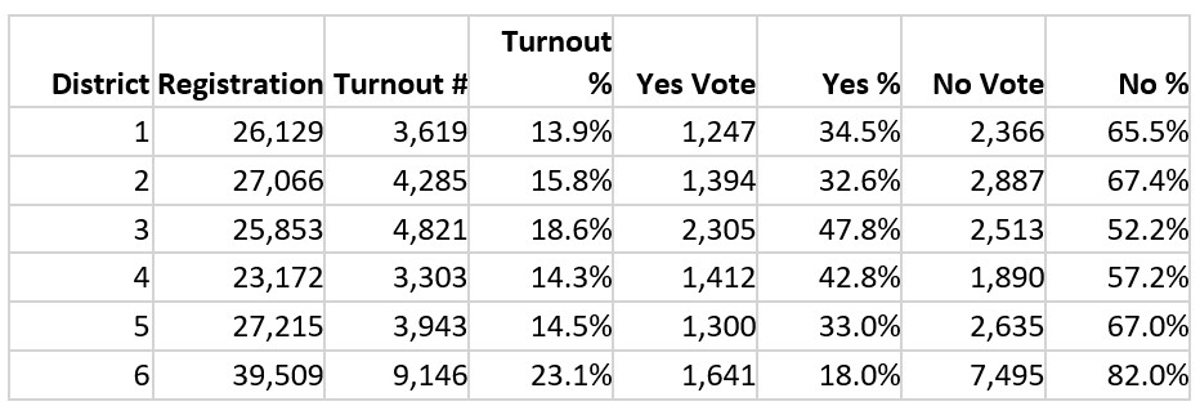
Both the “No” vote and voter turnout were highest in District 6 in Anaheim Hills. The next highest turnout was in District 3, which probably reflects UNITE-HERE Local 11 piggybacking it’s campaign to qualify a recall of Councilmember Natalie Rubalcava onto its “Yes on Measure A” canvassing.
Although Democrats have an 17-point registration advantage in Anaheim, partisan voter turnout was virtually even:
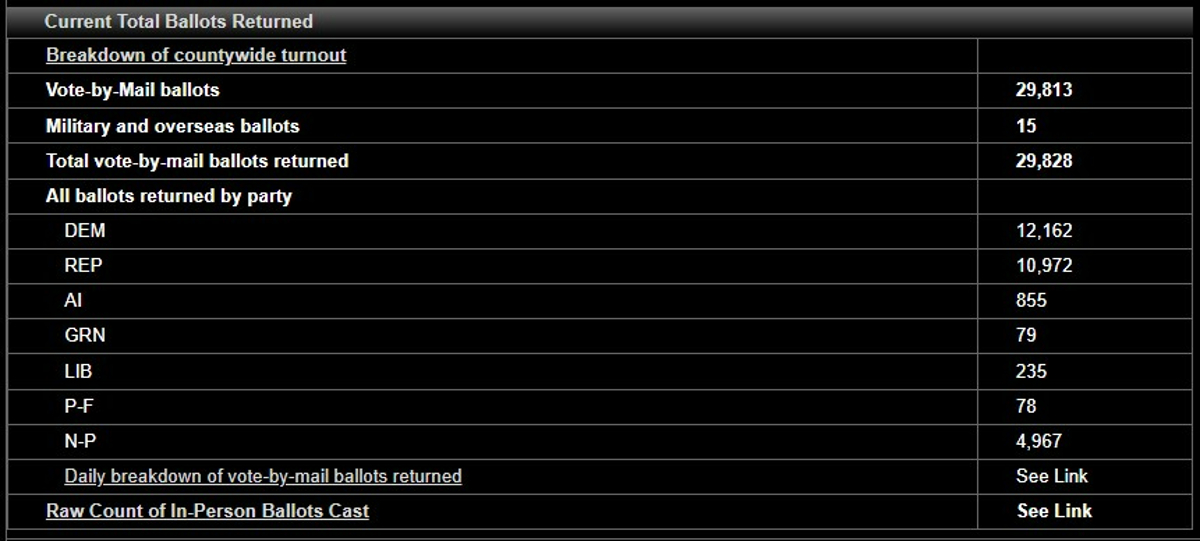
The “No” vote carried super-majorities among voters who returned their ballots via mail and at voter centers, although the “No” sentiment was even more pronounced among the latter:
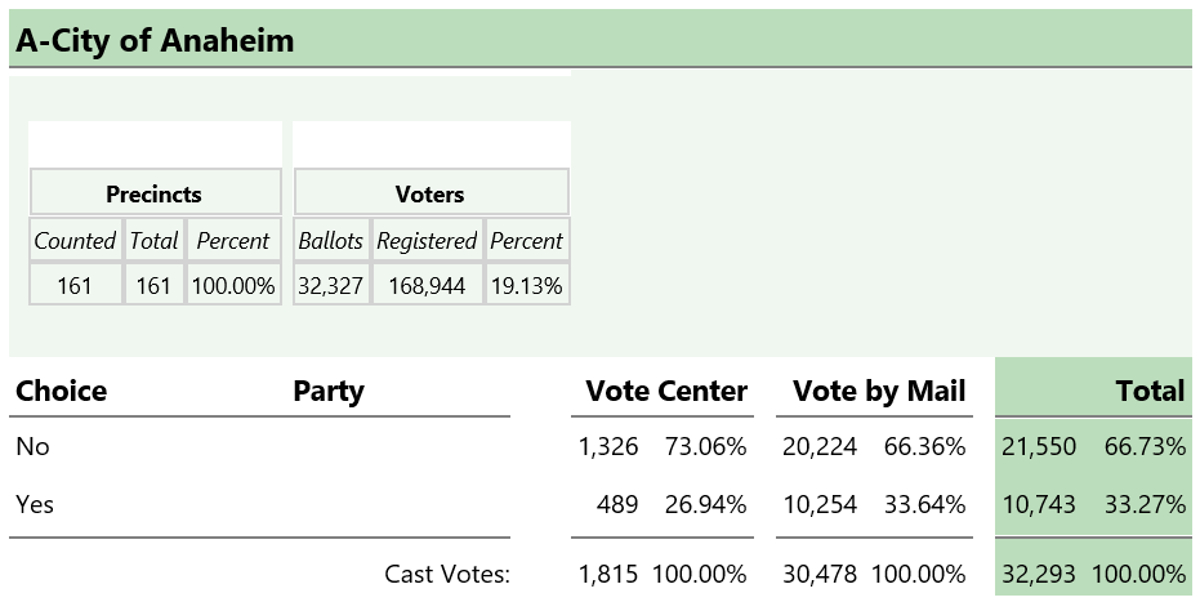
“Anaheim voters’ message on Measure A is clear – they stand for small businesses and their employees, they stand for police and fire protection, and they stand for protecting taxpayers’ funds,” said Barbara Badalian of the family-owned Tropicana Inn. “They don’t stand with an outside interest’s plan to derail the city’s budget for decades to satisfy their expensive agenda.”

